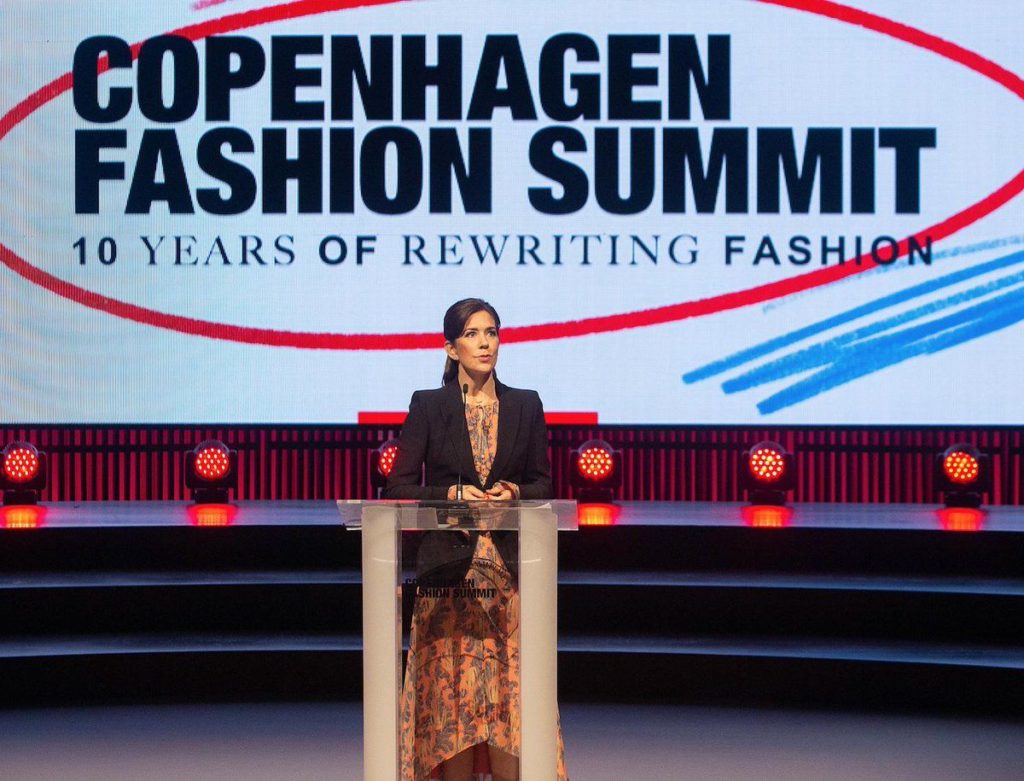As consumers, we are used to our position of privilege. The global fashion industry exists to serve the needs and wants of the consumer, but how can we use that privilege to become a force which drives brands to implement changes that empower and protect their workers?
This question was asked at the 10th annual Copenhagen Fashion Summit, which I was fortunate enough to attend. The Summit is all about bringing to light sustainable solutions in the fashion industry, and with an agenda that sought to reflect and celebrate ‘10 Years of Rewriting Fashion’, it was an inspiring two days.
The opening address was given by Princess Mary of Denmark, a Patron of the Copenhagen Fashion Summit and Global Fashion Agenda. Speaking to an audience made up of fashion brands and INGOs from across the globe, her challenge was strong.
‘Profit cannot continue to be the main measure of success,’ she said. ‘We need to change the way we produce, market and consume . . . Sustainability meets the needs of the present without sacrificing those of future generations.’
This really set the tone for the rest of The Summit.

After all, one of the biggest obstacles to a more sustainable fashion industry (and a more sustainable life!) today, is that overwhelming need for instant gratification. As consumers, many of us struggle to see the difference between ‘must have’ and ‘nice to have’. And same day delivery and credit card shopping mean that we no longer view anticipation as a pleasant or desirable experience.
It is hard to measure the impact this has had on our world, but I believe it remains one of its greatest threats.
I have often wondered how much our consumption would lessen if the buyer were responsible for personally recycling or repurposing the components of the item they had purchased, rather than the comparably simple ‘out of sight and mind’ exercise that donating and recycling items has become.
In other words, what would the world look like if we as individuals were charged with the duty of considering the needs of future generations? And I was surprised to find that my internal wonderings were also on The Summit agenda, as companies were challenged to think about the full life cycle of the products they produce—from design to disposal!
Given that the global fashion industry is responsible for 10 per cent of greenhouse gas emissions (by comparison, air travel contributes 1 per cent), its impact on the environment is both a serious and daunting topic.
I was somewhat shocked to learn that the solutions to reducing environmental impact already exist, but that cost and scale have served to slow their uptake within the global fashion industry. But hope came in the form of Francois-Henri Pinault, CEO of Kering Group, who said:
“We have the means, knowledge and ideas. We can make this happen. We can do it with dedication, creativity and above all action . . . We need to collaborate, innovate, and make firm commitments.”
And I believe this was the pervading theme of The Summit: collaboration.
Individual brands cannot hope to solve this issue alone. Companies must act together in order to successfully address these challenges and bring real change. No single person is going to make the global fashion industry more sustainable.
And, interestingly, it’s similar for us as consumers too.
As a researcher for Baptist World Aid’s Ethical Fashion Report, one of the most jarring moments of The Summit for me came when the CEO of The Summit commented that, as a consumer, I might stamp my feet and shake my hands within stores demanding change, but that those demands would be unsuccessful, because it’s up to companies to implement change.
And, sure. If I were to do that alone, then I would likely achieve very little. But in six years of producing the Ethical Fashion Report, one thing Baptist World Aid has become certain of is the collective power we have as consumers.
Throughout the course of The Summit, multiple speakers reflected on the fact that consumers are becoming more educated. And that as consumers become more educated, their shopping habits change. It is these habits which serve to fuel the global fashion industry—visit any fashion company on a Monday morning and you’re like to find them meeting to discuss what did and didn’t sell.
As a consumer, your shopping choices have the power to move a company to action.
So, how will you use YOUR privilege?



 Heather Keith,
Heather Keith,

 Sophia Russell,
Sophia Russell,